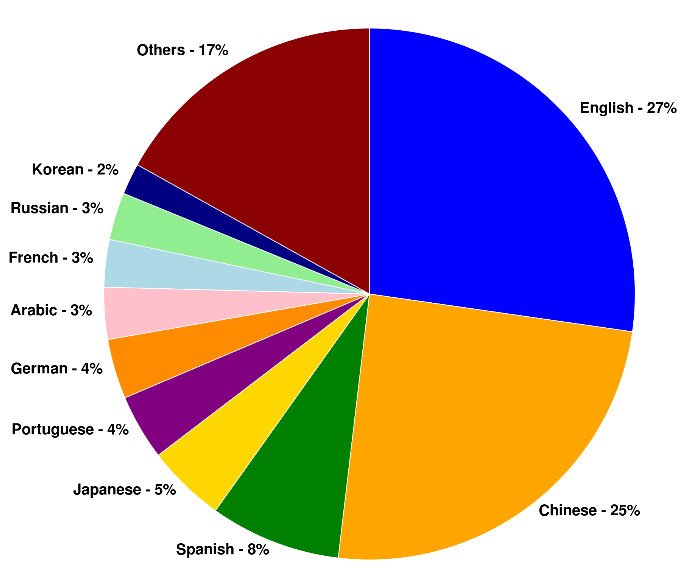How To Write In English When You Are Not English
American, Canadian, Australian etc.? In other words, how to write in English when English is not your native language? Before I answer this question, I'd like to briefly reflect on WHY you should write in English in the first place.
Well, the first reason is that English is still by far the most popular language used on the Web (even though the trends have been changing recently). According to Wikipedia and other sources almost one billion people use English on the Internet. Chinese is close behind, but Spanish, which is in third place, is four times less common than English!

Yes, you can write in your native language and be successful, but as English still offers the greatest potential, you should at least consider using it, especially, if you are a user of one of the less popular languages (e.g. Polish). Certainly, don't we all, as bloggers and website creators, want to reach as many people as possible?
Communicating in English translates into larger search traffic, access to better affiliate programs, more products to promote, wider variety of high-quality services, etc. Moreover, if you don't plan to run your website, but want to publish your articles on someone else's platform instead, writing in English offers you practically endless opportunities.
So, with the hope that the sheer power of statistics has convinced you, and you already know why it is worth to write in English, I can get to the 'how' part.
Here's what you are going to learn from my post:
- Firstly, I am going to explain why I even dare giving you advice on how to write in English.
- Secondly, I am going to give you some tips on how to improve your English skills in general and writing skills in particular.
- Thirdly, I am going to try to find out if it is possible to use your native language while writing in English.
- Lastly, I am going to give you some general tips on how to write any type of text . I will also give you one piece of advice on how to overcome every author's biggest fear. (Do you know what the fear is?)
So, if you are not a native speaker of English and you are building your online presence with that language, read on and make a good use of the info you gain from my article. If English IS your native language, please, do read the article as well. Who knows? Maybe you'll find some tips for yourself :)
Who I am and why I think my English is oh so great!
At this moment, some of my dear readers may be asking themselves the following questions: 'Who is this guy? Why does he think he can tell me how to write in English? Who the heck does he think he is?'
Well, you've got every right to find out who I am and I have nothing to hide:)
I used to be a freelance translator. For more than ten years I translated books and other texts into Polish (mainly from English). I liked my job, but a few years ago I decided it was high time to look for other ways to use my language skills. After considering some options I finally opted for creating websites, writing a blog and trying to monetize it.
When I started out, one thing bothered me a lot: I wanted to write in English but wasn't sure if I could do it. I mean, I did write a few English sentences once in a while, but expressing my thoughts in a foreign language and publishing my own articles on regular basis is a different story.
Let me put as simple as possible : I was terrified. Did you know that one of the greatest human fears is the fear of public speaking? Furthermore, publishing your own pieces of writing online is like speaking to an enormous audience. The same thoughts go through your mind. What will they think? Won't they laugh at me? Will they understand me in the first place?
These were my doubts. Fortunately, I became a member of Wealthy Affiliate. At some point I had to write (and publish) my bio. Funny as it may seem, that was a defining moment for me. The positive feedback I got boosted my confidence as an author of English texts.
Here I am now: writing my blog, creating niche websites, posting articles at Wealthy Affiliate. Many people have helped me to get where I am now and now it's my turn to help others - bloggers and affiliate marketers who would like to improve their writing skills. That is why I wrote this post. I hope you will benefit from reading it. So, let me finally reveal my 'secrets'.
Read, Listen, Think
Writing in a foreign language is a difficult task. To do that, you need something more than a good knowledge of grammar and vocabulary. (As a side note - you might want to check this very interesting discussion on grammatical errors and Google ranking) You need to 'feel' the language as good as you can. Here's what you can do to 'deepen that feeling'.
1. Read

Read a lot. I bet you read a lot anyway. You search web pages, you read posts, reviews, etc., don't you? Just remember to do it in the English part of the Web!
Use every opportunity to read. I advise you to change the language settings in your gmail, google analytics, google drive, etc. to English. Do you know what happened when I did it with google analytics? Suddenly, the English terms they use started to make much more sense to me than their Polish counterparts.
I also strongly advise you to read books. What? Books! I know that there are people for whom the mere word 'book' looks and sounds scary, but believe me - books aren't that bad. In fact, books are OK.
Find something interesting to you, such as a detective story, a historical book or a love story and read! Just make sure it is well written. When you read, you enrich your vocabulary, you get use to the English sentence structure, you learn different writing styles and you can have great fun, too.
If you need to improve your skills in a particular area, read articles about the topic you are interested in. Want to learn something about SEO (Search Engine Optimization), for example? Read about SEO - in English!
Immerse yourself in English! That really is the good, proven way of learning any foreign language. You must be immersed in the written English, before you start producing your own pieces of writing.
2. Listen

This advice seems less obvious than the advice to read. However, I must tell you that listening is just as important as reading.
Keep in mind what your aim is. All you want to do is to communicate with your audience as naturally as possible, as if you were talking to them. That's why you should listen to someone who actually speaks English.
Besides, very often it is much easier to listen to a podcast or a video lesson than to read. You can listen to it while doing something else, like cooking or driving a car.
Again, listen to what is interesting to you and useful for you. If you want to learn about Amazon Associates, listen to Jay's video on this topic. Not only will you gain a large amount of knowledge but also you will learn new terms and structures, which you can later use in your posts.
3. Think

Don't worry! I am not going to tell you to eavesdrop on other people's thoughts to learn how to think in English. No, no! I just claim that by reading and listening, that is by immersing yourself in English, eventually you will be able to think in that language.
Why is it important? Well, I have seen many texts which were unreadable just because the author 'translated' his or her thoughts from his/her native language into English. I have commited that crime more than once, myself.
If you don't think in English, your native language could become your enemy and it will be very hard for you to show to the world the awesome piece of content you have in your head. It doesn't have to be like this, though.
Your Native Language - Enemy or Friend?
Your native language can become your friend, if you know how to use it to your advantage.
You can mix some humor to your writing by using a funny or strange phrase which a native speaker of English have never heard of; or you can think of a saying which describes a particular phenomenon better than English phrases and explain it to your readers, etc.
If I told you, for example, that you shouldn't 'look for a hole in the whole' while producing a piece of content, most probably you wouldn't know what I mean. That would be perfectly normal, because such a phrase simply does not exist in English.
However, if I told you that this is a cute way to tell you not be too... Oh, wait a minute! If you want to know what this phrase mean, go to the next section.
My point is that your native language - or more broadly your culture - is an abundant source of various elements which can enrich your writing. This is not something that puts limits on you: on the contrary - it gives you many more possibilities!
Write and Publish
So far I have been talking only about theory. Writing is not a theoretical knowledge, though. It is a skill which should be constantly practiced and improved. Hence, my last advice: write, write, write and publish!
If you are afraid to 'go big' right away, you can begin with writing an email to an English-speaking friend or a private message to a member of Wealthy Affiliate. Even comments to other people's articles are good for a start. That way you get used to writing and publishing in English, you gain confidence and - hopefully - some feedback.
At one moment - sooner rather than later - you will have to write (and publish) longer texts. Don't wait until you 'ingest' all the theoretical knowledge. This simply isn't possible and perfectionism is one of your worst enemies.
That's not to say you can make typos every second word. I just would like to warn you that you should not 'look for a whole in the whole', that is you shouldn't be overly critical about your own articles.
Keep in mind that your aim is to publish regularly on your website, potentially for large audience. If you try to be perfect, your effectiveness will decrease drastically.
As for spelling mistakes, you can and should use such programs as Grammarly, for example. If you use WA Site Content Editor, don't forget to check grammar and spelling after you've completed your post.
Also, you want to get as much feedback as possible. Very often other people notice things you can't see. Feedback is crucial. When you publish a new post, ask for feedback. Remember - you write for people, so you want to know what people think about your writing.
That brings us again to the greatest fear of every author - the fear of being judged. The ways to fight this fear deserve a separate post. Here I just would like to give you one piece of advice or rather a thing to ponder on.
Imagine you wrote a post about SEO. Do you think people will read it because they want to find every mistake you could possibly have made or they will read it to get some useful information? Of course, the latter will be the case.
As long as your content is loaded with valuable information, you can get away with a typo or two; or even with grammatical and stylistic mistakes. So - go and write some awesome content in English and don't let this fear prevent you from publishing it!
Additional Tips
Although this is not the main topic of my article, I thought it could be useful to provide you with some general rules on the proces of creating content. I don't go into any details here, so for more information see this lesson.
Here are the essential stages of writing any type of text:
1. Make a plan - breakdown your content into main ideas.
2. Use an intro to let the readers know what they will be reading about.
3. Write catchy headline and sub headlines.
4. Don't worry about the structure and mistakes while writing the first version of the article. Edit it later or have someone else to do it (thank you, Alice).
5. Write a brief summary and tell the reader what you want him/her to do AFTER he/she has read your post.
Patience Is Everything
Ok, so now you know all my secrets and answers to the question 'How to write in English when you are not English'. They work for me and I hope they will work for you.
There is only one last thing I'd like to tell you: be patient! Learning and mastering a skill always takes time. However, if you read, listen, think, write and publish in English, soon you will be able to use the most popular language in the world to produce awesome pieces of writing. That is my wish for you.
I would love to hear about your experiences as an author of texts in a language that is foreign to you!
If you have any questions or comments, please leave them below. Any feedback would be greatly appreciated.
Happy writing!
Zbigniew
Join FREE & Launch Your Business!
Exclusive Bonus - Offer Ends at Midnight Today
00
Hours
:
00
Minutes
:
00
Seconds
2,000 AI Credits Worth $10 USD
Build a Logo + Website That Attracts Customers
400 Credits
Discover Hot Niches with AI Market Research
100 Credits
Create SEO Content That Ranks & Converts
800 Credits
Find Affiliate Offers Up to $500/Sale
10 Credits
Access a Community of 2.9M+ Members
Recent Comments
12
Hello Zibul, my first blog is in czech, but I am going to create a website in english soon (so that I can reach more people...) and this article is very useful for me. Thank you! :)
I am so glad I could help. Let me know when your English website is ready! Wish you much success!
Thank you Zibul for your post. I always think we are a minority a little bit lost here.
But even if you are right, I write in French, because my Website is a piece of me, I have an intimate relationship to it and I want to express myself exactly as I am feeling, in order to reach people not over the language only but over analogies, symbolics and this is something I can do only in my mothertongue.
However, I consider in the near future to let it translated in English and German.
It comes right to my mind, I had a comment in English last day and answered in English of course but really, it is not satisfying to me, giving an answer at a lower level because of my limited knowledge. It is not me, if you understand what I mean.
Of course, I will improve, it just needs time.
I like the way you write, thank you again.
Have a nice Sunday.
N with a smile
I cannot agree with you more. I will never be able to communicate in English as well as in Polish. The point is that I will never be able to communicate in Polish with large part of the world:)
Z with a smile
Hi Zibul,
It is satisfying to be able to write in English as a non-native English speaker and the world becomes much bigger, right? But you could face much more competition depending on a niche!
Great article by the way.
Hi! Thanks for the comment.
You're right about the competition. I did some research, though. It turns out that in some niches the competition in the Polish part of the Web is virtually non-existent, which in some cases mean that no one is interested in that particular niche. If that is the case, there is no point to create a niche webiste in the first place.
All the best to you!
I have a travel blog I write in Japanese. I am getting more traffic with this site even though I wrote more on my blog in English.
It's a different niche and you can't compare but it seems it's much easier to get traffic with my Japanese blog.
That is great! As i write in the article - you definitely can be successful when you write in your native language. I think it all boils down to one phrase - It depends.
See more comments
Join FREE & Launch Your Business!
Exclusive Bonus - Offer Ends at Midnight Today
00
Hours
:
00
Minutes
:
00
Seconds
2,000 AI Credits Worth $10 USD
Build a Logo + Website That Attracts Customers
400 Credits
Discover Hot Niches with AI Market Research
100 Credits
Create SEO Content That Ranks & Converts
800 Credits
Find Affiliate Offers Up to $500/Sale
10 Credits
Access a Community of 2.9M+ Members
WOW very well written, thought out post! My native language is English, although I'm first generation Australian, I'm the child of Greek immigrants so my first language when I was very young was Greek, so I have a lot of empathy for those WA members trying to think and write in English!
I believe your guidance above is a great starting point, well done Zibul!!
Cheers Gina
Thank you Gina. If you know anyone, who could benefit from reading my post, feel free to share it. Cheers!